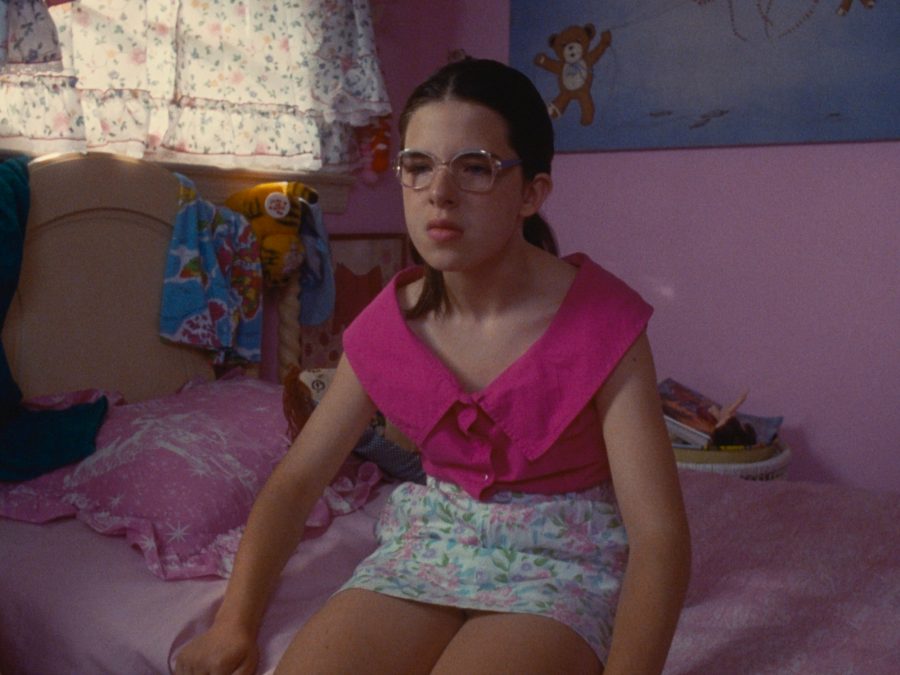American pupils are 12 years old when they enter Junior High. It can be a difficult age – the cusp of puberty, where childhood collides head-on with adolescence, and some shoot ahead while others are left behind. Dawn Wiener (the extraordinary Heather Matarazzo, carrying the whole film in her big-screen debut) definitely falls into the latter category. Todd Solondz’s breakout feature Welcome to the Dollhouse is an agonising, unflinching portrait of all Dawn’s awkwardness and indignation, as, in the stultifying suburbs of New Jersey, she learns again and again that meanness rules and life isn’t fair.
No longer able to coast on cuteness like her younger sister Missy (Daria Kalinina), and not yet driven by desperate ambition like her older brother Mark (Matthew Faber), Dawn is caught in the middle, desperate to be loved by her parents (Angela Pietropinto, Bill Buell), by her school peers and by Mark’s older bandmate Steve Rodgers (Eric Mabius), but in fact treated only with disapproval and disdain if she is noticed at all.
Dawn’s thick-lensed glasses, hideous fashion sense and even her surname make ‘Wiener Dog’ an easy target for school bullies, and she is constantly, cruelly attacked by others. Nor does Solondz’s screenplay easily let her off the hook: for while we may sympathise to a degree with Dawn’s victimhood and endless humiliation, she is herself rather unlikeable and more than capable of her own cruelty, giving as good as she gets with bad behaviours that she has learnt.

Dawn is a chronic liar, and lashes out viciously when annoyed or cornered. She casually refers to her chief bully Brandon (Brandon Sexton III) with an ableist term, not realising that the brother of this posturing bad boy has a developmental disability. She uses a hateful homophobic slur against her younger best friend – and only fellow ‘Special People Club’ member – Ralphy (Dimitri DeFresco) and she readily imitates the bullying that she herself suffers at school in her own treatment of little Missy at home, in a conflict which shifts from merely mean-spirited sibling rivalry to something more like psychopathy (at one point Dawn holds a hammer over her sleeping sister – although she does step back from the brink).
Here Dawn’s budding sexuality is as much a source of concern as celebration. Set against a menacing backdrop of child abductions and local paedophilia, Dawn pursues her puppy love for sexually practised, ‘horny’ Steve with worrying, calculated aggression – and her evolving relationship with the slightly older Brandon, as downtrodden and alienated as she is and somewhat sweeter than he first seems, is nonetheless punctuated by his repeated threats to ‘rape’ her (backed up with a knife). These kids’ prepubescent urges are in no way soft-pedalled or romanticised, and while these drives are not always predicated in due understanding or experience, they are hardly innocent either.
Solondz certainly knows his way around the tropes of a high school movie, including stock scenes in the cafeteria, toilets, classroom, corridors, assembly hall and principal’s office – yet where he innovates is in an uncompromising refusal to equate adolescence with improvement. In any other teen film, Dawn would learn valuable lessons, have a makeover, and eventually emerge from her ugly duckling status to become popular or even prom queen. Yet in Welcome to the Dollhouse, Dawn is applauded and loved only in her dreams – and finally is informed by Mark, who is dismissed as “king of the nerds” by another character and has clearly had it every bit as hard as Dawn, that things barely get better in Senior School, or in life.
Welcome to the Dollhouse is a comedy of cringe, capturing all the discomfort and gawkiness of coming of age. Without it, there would be no other ‘special people’ films like Jared Hess’ Napoleon Dynamite or Adam Rehmeier’s Dinners in America – features which revel in the country’s marginalised misfts and bewildered weirdos. Solondz’s film is funny, to be sure, but alway uncomfortably so, as each and every character’s selfish, sadistic side is exposed and enacted. Nobody comes out of this looking pretty, and dignity – a key word in the film – is always far removed from these characters’ Darwinian struggles to survive their day without being rejected, mistreated or much, much worse.
Yet the real irony is that, when this mid-Nineties film is viewed today, it becomes clear that had Dawn – or Mark – been born but a decade later, their nerdiness and neediness would mark them as genuine generational heroes rather than mere embarrassment-inducing protagonists. Perhaps there is, after all, a better future in store for ‘Wiener Dog’. For her ungainly, myopic rites of passage mark her as the Dawn of a new online age where oddballs, nerds and losers at last inherit the imperfect Earth.
Welcome to the Dollhouse is released on Blu-ray by Radiance Films, 6th March, 2023.
The post The perverse suburban joys of Welcome to the Dollhouse appeared first on Little White Lies.


0 Comments